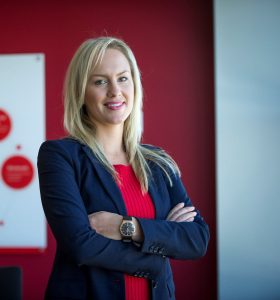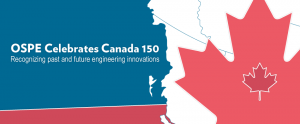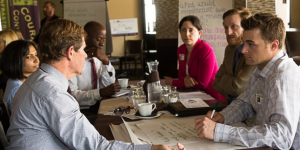 Angela Wojtyla is the Director of Consulting at CGI Group Inc., with experience at Redknee Inc., Hydro One, and Manitoba Hydro. Angela joined the Board in 2018 and is the current chair of OSPE’s Women in Engineering Advocacy Task Force (WE ACT).
Angela Wojtyla is the Director of Consulting at CGI Group Inc., with experience at Redknee Inc., Hydro One, and Manitoba Hydro. Angela joined the Board in 2018 and is the current chair of OSPE’s Women in Engineering Advocacy Task Force (WE ACT).
She has a history of supporting women in engineering through initiatives like: WE ACT, the Women on Boards Diversity Committee at the Information Technology Association of Canada, and she is also a founder of the Women in Trades, Technology and Engineering Committee at Hydro One.
Angela obtained a B.Sc. in Electrical Engineering from the University of Manitoba and an MBA from the Rotman School of Management at the University of Toronto.
We sat down with Angela Wojtyla to get a better understanding of what attracted her to OSPE, what her path through engineering has been like, and what she hopes the profession will be like in the future.
Why were you initially interested in engineering?
My interest in engineering is due to the fact that my grade 10 electronics teacher encouraged me to enter the field because he thought I was a natural with the course material. I always knew I would pursue a university degree and when I entered grade 12, I had to think about my future and make a decision on the next stage of my life. Remembering the words of encouragement from my teacher influenced me to explore the engineering programs and I discovered that math and science were the core focus (my two favourite subjects). Engineering was actually my second choice – I was initially planning to become a psychiatrist. However, I learned that a medical degree is required and I don’t do well with blood, therefore engineering was the better fit.
What were some barriers that you had to overcome as a female in a male-dominated field?
I bartended and served throughout university and this job truly taught me to grow a thick skin early on. From my experience, the way people treated others was greatly dependent on how they were brought up and their limited experiences with women in engineering or situations that weren’t the norm. As such, they wouldn’t know how to deal with these uncommon interactions. It was hard to tell if they were serious, but some would make comments like, “Women shouldn’t be in engineering”. The majority of people are not comfortable with change and try to resist things that are uncommon. Perseverance is a great attribute to have when pursuing a profession where you are a minority in the workplace. It is very important to note that I have had many males as positive mentors or allies that have helped me navigate my career. Ultimately, my inner confidence and resilience were key to propelling me forward.
Why did you decide to get involved with OSPE from a governance perspective?
I grew up, studied and started my working career in Winnipeg. The engineering association in Manitoba combines regulation and advocacy directives and when I moved to Ontario, I assumed PEO had the same mandate. When I learned about OSPE, one thing that really stood out to me is the community it fosters amongst engineers. When you are in an engineering program in university, everyone is very proud to be in engineering. Once they graduate, they typically lose that sense of community and pride. I really wanted to join OSPE to advocate empowering my community and creating a network of trusted colleagues and professionals.
You are the current chair of the Women in Engineering Advocacy Champions Task Force (WE ACT) for OSPE. Can you speak about the work you do and what goals you plan to accomplish through this committee?
I became the chair of WE ACT in December 2018 and one thing that I realized is that our progress is highly dependent on our volunteers and their time is very limited. I really wanted to guide and enable our volunteers to be able to implement our plan and ensure that the work we do is something they would be very passionate about. In the beginning of the year, we developed our 2019 plan and focused on three pillars:
- Recognition – The purpose is to ensure women are being recognized for their accomplishments and to help streamline the nomination processes for the notable awards we make nominations for.
- Community and Partnership Engagement – This initiative focuses on creating and sustaining partnerships with other organizations and groups who align with WE ACT’s mandate. Instead of following a traditional process, we are collaborating with other organizations to promote quality events to enhance their networks and broaden their skills.
- Advocacy and Policy – We focus on the legislation and provide recommendations for policy submissions to government and industry.
We’ve seen that you’re a part of programs such as Information Technology Association of Canada’s Women on Boards and CGI Diversity & Inclusion STEM Camp. Can you tell us a little bit about these initiatives and why you think it’s important to be involved in the engineering community?
The Women on Boards initiative is where we hold “Discovery Days” with our team to educate women in leadership roles on what a board role entails and the experience needed in obtaining a board position. We also developed a network of board ready women to introduce them to technology companies and encourage gender diversity on boards and in senior management. The CGI Diversity & Inclusion STEM Camps focus on 8 to 14-year-old children from various diversity dimensions. This year, we decided to focus on children who are female, Indigenous, new immigrants and from low-income families to participate in the STEM camps. We organize the camps and teach them how to program Raspberry Pi computers. We also teach them about STEM and what their future could potentially hold if they were to pursue a career in STEM. I am hopeful these camps will provide the same encouragement that my grade 10 electronics teacher provided to me. I think it’s important to always give back to your community. Educating others, especially children, can truly make a large impact on their futures. Being involved in these organization provides a conduit for me to keep other engineers and colleagues empowered, help them to build confidence in their careers, and encourage those that are not yet in the profession to envision a future in STEM.
We see from your experience that you have held a few management positions at various companies. Can you speak about how you incorporated diversity and inclusion as a leader?
As a manager I have had the privilege of ensuring every employee and contractor feels included and knows their opinions matter. Any person, no matter their orientation, experience or background, should have the same opportunity to grow and succeed and I have always supported their ability to do so. For example, when working as a field engineer at Hydro One I spearheaded and founded the first Women in Trades, Technology and Engineering network forum ensuring women in the field would be supported and empowered in their daily work and career trajectory. In another example, when I was a Business Manager reporting to the CEO of Redknee, a publicly traded software monetization company, I ensured, through employee engagement initiatives that I created, that the employees from the companies we acquired felt included and would be excited about their future. Through these initiatives they felt the company cared for their professional progression and any hurdles they may have had during their transition.
Do you have any advice for engineers who are entering the field?
My advice would be to be open to new challenges and take risks earlier in your careers.
What do you hope the future of engineering will look like?
I would bring it back to pride. A lot of engineers don’t stick to engineering after graduation. It would be great for executives and entrepreneurs who are engineers to promote the profession and be proud of their engineering degrees. We are all engineers at heart. I think having that proud and devoted community back would be empowering. I also hope the future of the engineering profession becomes more diverse and inclusive. To advance the engineering profession, we need to incorporate alternate perspectives and that begins with more equity, diversity and inclusion.
Have any questions for Angela, or have suggestions on other members we should feature? Let us know in the comments below!





